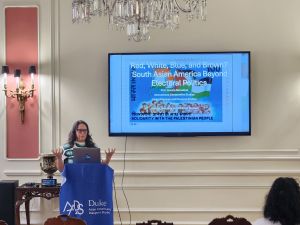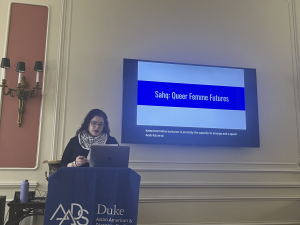Feeling Asian American, From Netflix to Drag

Duke’s 2024 Asian American Diaspora Program Fall Symposium, held on October 26th, was centered around the theme “Feeling Asian America,” delving into the pain, pleasure, joy, guilt and rage which create what we understand as “Asian America.” Spanning talks, discussions, a workshop and a drag show, the symposium interrogated the quotidian and the structural fabric of racialized contemporaries.
David Eng, who is the Richard L. Fisher Professor of English and Faculty Director of the Program in Asian American Studies at the University of Pennsylvania, opened the symposium with a talk titled “Racial Rage, Racial Guilt: The Uses of Anger in Asian America.” Asians, Eng argued, are tasked with simultaneously holding white guilt and Black rage, a kind of gaslighting which effectively transforms them into ‘racial coolies.’
Through a discussion of the Netflix show “Beef” and a case history of an Asian American woman, Eng illuminated the anxieties wrought by an unstable Asian subjectivity constructed alongside Black and white subjectivities. Falling into a genealogy of racial melancholia, the Asian subject is made to bear the weight of intertwined racialized affects which were never her own.
Eng’s talk was followed by Kareem Khubchandani, who is the Associate Professor of Theatre, Dance and Performance Studies, as well as Studies in Race, Colonialism and Diaspora at Tufts University. In his talk, “Auntologies: BDSM, Porn, Fashion, and Queer Futures,” Khubchandani picked up some of the complicated threads of identity-formation put forth by Eng.
Khubchandani began by paying homage to his own aunties, and the ways through which their expansive ways of doing gender informed his own. He then laid down his goal for the talk: to think queerly with aunty and her “sheer impossibility.” Thinking against popular conceptions of the aunty as the embodiment of excess or as antagonists of queer potentiality,
Khubchandani asked what shifts when aunty is situated in economies of pleasure instead of disdain and derision. What new opportunities arise when aunties are repositioned in relation to one another, instead of being in a perpetual caretaking role for younger generations?
Taking up sources as diverse as TikToks, memes, film, fashion, coloring books and porn, Khubchandani carved out new spaces for thinking about aunties’ creativity and innovation under a heteropatriarchy which cannot fathom their queerness.
In the final talk of the day, “Racist Love: An Interactive Workshop on Cute Things,” Leslie Bow unraveled ideas about cuteness often taken to be self-evident. Bow, who is the Vilas Distinguished Achievement Professor of English and Asian American Studies and the Dorothy Draheim Professor of English at the University of Wisconsin Madison, proposed that we pay attention to the racial productions intrinsic to what Cathy Park Hong terms “minor feelings,” like affection, care, humor and love. How can professed attraction, she asked, become the very form of anti-Asian bias?
Beginning at Frank Chin and Jeffrey Paul Chan’s seminal 1972 essay “Racist Love,” Bow argued that Asians occupy a core anxious, ambivalent space in contemporary U.S. culture. Stereotype, caricature and fetish all emerge out of this ambivalence, and one of their less-investigated byproducts is globalized cuteness.
Bow put up images of objects modeled after racist Asiatic caricatures and asked the audience to decide if they found the objects cute or not. Cuteness, she explained, reflects asymmetries of power — what Sianne Ngai described as the “aestheticization of powerlessness.” Cute things are thus conduits of political desire, allowing us to enjoy asymmetrical power relations that suggest forms of spectatorship.
The day ended with a drag show, “Lessons in Drag w/ LaWhore Vagistan.” Equal parts drag, lecture and audience discussion, the show brought together critical theory, lip syncing, dancing and comedy in a celebration of queer joy and community.
Knowledge, Vagistan taught us, cannot be limited to the sober confines of the classroom. Instead, its articulations and productions — in text, in Asian American Studies and in drag — are at their most compelling when they are pushing towards more expansive futures, for aunties, for the people they care for, and for us all.







